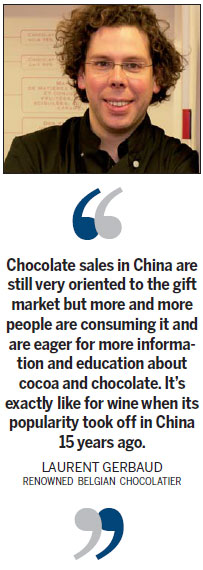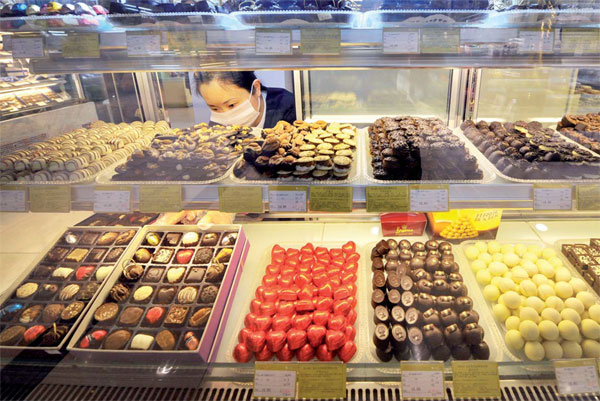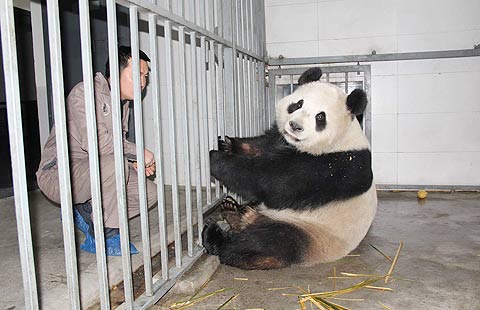China jumps aboard the chocolate express
Updated: 2014-02-21 08:32
By Martin Banks (China Daily Europe)
|
|||||||||||
|
As Chinese incomes rise and their desire to try new things grows, their appetite for chocolate is catching up. Provided to China Daily |
Surging demand is like comfort food for Belgian manufacturers seeking new growth points
China's fast-growing taste for chocolate may come to the aid of a long-standing Belgian tradition.
Despite the quality of Belgian chocolates, their sales have stagnated or fallen in Europe and North America over the past several years.
Overall exports of Belgian pralines rose just 1 percent between 2008 and 2012, but rose 60 percent in Asia and 82 percent in Africa.
Sales to Asia in 2012 were three times their level a decade earlier, and individual Belgian chocolate makers report expansion in China last year of up to 50 percent.
With European sales falling, Belgium's chocolatiers are now increasingly looking to emerging markets, notably China.
Sylvie Douche, co-founder of the international trade fair Salon du Chocolat, says: "While worldwide chocolate consumption has always been substantial, it is now increasing further largely thanks to a growing interest in chocolate from countries like China.
"This sales explosion, 20 percent so far this year, is persuading the major creators, especially the Belgians, to innovate in order to target a demanding clientele."
Flanders Investment and Trade describes chocolate as "a true Belgian icon the world over", and the importance of chocolate to the country's gross domestic product should not be underestimated.

Year after year, more than 1 billion euros worth of the world's best chocolates made in Flanders alone are exported worldwide.
Overall, chocolate generates almost 4 billion euros for Belgian GDP each year and represents nearly 1 percent of the country's exports.
Even if European sales have dipped, Belgium still boasts the world's second-highest annual consumption of chocolate, 10 kg a person behind 12 kg in Switzerland.
China, by contrast, is one of the lowest consumers of chocolate.
Annually, the average Chinese person eats less than 100 grams of chocolate, compared with between 6 kg and 10 kg for Europeans. The average Japanese eats 11 times more and the average German 82 times more.
Even if public awareness among the Chinese of Belgium as one of the world's finest chocolate producers is low, it is likely to be enhanced this year with a Shanghai version of the Salon du Chocolat. A Belgium version was held this month.
Top Belgian chocolatiers such as Geert Decoster believe the dramatic surge of sales in China opens up great new opportunities that he believes they should seize on to keep pace with innovations elsewhere in the industry.
Decoster says Belgian chocolatiers are in danger of falling behind in the race to innovate, something that was recently brought home to him at the International Chocolate Awards in London, where he was the only Belgian prizewinner.
One reason for this, he says, could be that Belgian chocolatiers have not evolved in line with others in the industry.
"Chocolatiers in many countries without a great tradition of chocolate have now caught up with Belgian chocolatiers and are creating new and exciting flavor combinations," says the master chocolatier whose entry in London took first prize in the filled chocolates and caramel category.
Decoster studied for six years at the Chocolate Academy of Callebaut, and a few years ago the Belgian government named him as one of the 10 Best Belgian Chocolatiers.
An expert on chocolate combinations, he continually finds new accents to draw out the chocolate's fullest flavor and has even been known to make white chocolate with shrimp and goose liver.
His call for the Belgian industry to innovate is enthusiascally echoed by Laurent Gerbaud, another renowned Belgian chocolatier, who says Belgian producers are naturally eager for a share of surging demand in China.
Gerbaud is an award-winning chocolatier with shops in Brussels, Berlin, Paris and London and says his success in Belgium is mainly due to the tastes he developed during his two years working at a small workshop in Shanghai. Even his distinctive company logo features a red seal with the word "chocolate" in Chinese characters.
He says: "I was producing truffles, chocolates with nuts, chocolate cakes and muffins and chocolate mousse, only in dark chocolate, for expats and a few Chinese clients who were discovering the taste of real chocolate for the first time.
"It was between 1998 and 2000 and I was, unfortunately, a bit too early for the chocolate market in China. The Chinese customers had little taste for sugar in their cuisine and for sweets and desserts in general so I finally lost the taste for sugar myself."
Back in Belgium, he says, he could not work with traditional Belgian recipes anymore and kept working with dried fruit, nuts, candied fruits and spices, mixed with 75 percent dark chocolate.
Describing his products as "powerful, addictive and very distinctive" from those of his colleagues, he is now working with a Chinese partner in Hubei to develop a "future chocolate concept".
"The idea is to offer fresh chocolates for private clients. It's a bit like a club, with a limited number of members.
"Chocolate sales in China are still very oriented to the gift market, but more and more people are consuming it and are eager for more information and education about cocoa and chocolate. It's exactly like for wine when its popularity took off in China 15 years ago.
"It is really important to keep the cultural taste and gastronomic particularity and not overwhelm the Chinese market with products we are trying to get out of the shelves here in Europe, filled with corn syrup, palm oil and cheap cocoa. The Chinese taste is delicate and should not be spoilt with Western sweet taste."
Today he has a small company in Brussels that employs six people who make seven tons of chocolate a year, all handmade.
Gerbaud says that as Chinese incomes rise and their desire to try new things grows, their appetite for chocolate is catching up.
With a population of 1.3 billion, even the relatively small rise in demand per person has led China's chocolate sales to surge, 40 percent in 2012 over the previous three years.
Watching all this with interest is the Belgian chocolate maker Leonidas, which has been flying the flag for Belgian chocolates for generations and marks its 100th anniversary this year.
Its managing director, Robert Torck, says: "We have kept pace with consumer demand for different flavors and packaging but what's really changed throughout these 100 years is our development beyond Belgian borders. Today, we have almost 1,300 points of sale around the world, from Europe to China."
China Daily
(China Daily European Weekly 02/21/2014 page22)
Today's Top News
Pandas arrive in Belgium
China urges US to correct mistakes on Tibet
9 punished for spreading flu rumor
Beijing upgrades haze alert
Ukrainian parliament dismisses president
China strongly opposes Obama-Dalai meeting
Tax refunds to lure overseas tourists
Prosecutors tackle food crimes
Hot Topics
Lunar probe , China growth forecasts, Emission rules get tougher, China seen through 'colored lens', International board,
Editor's Picks

|

|

|

|

|

|






